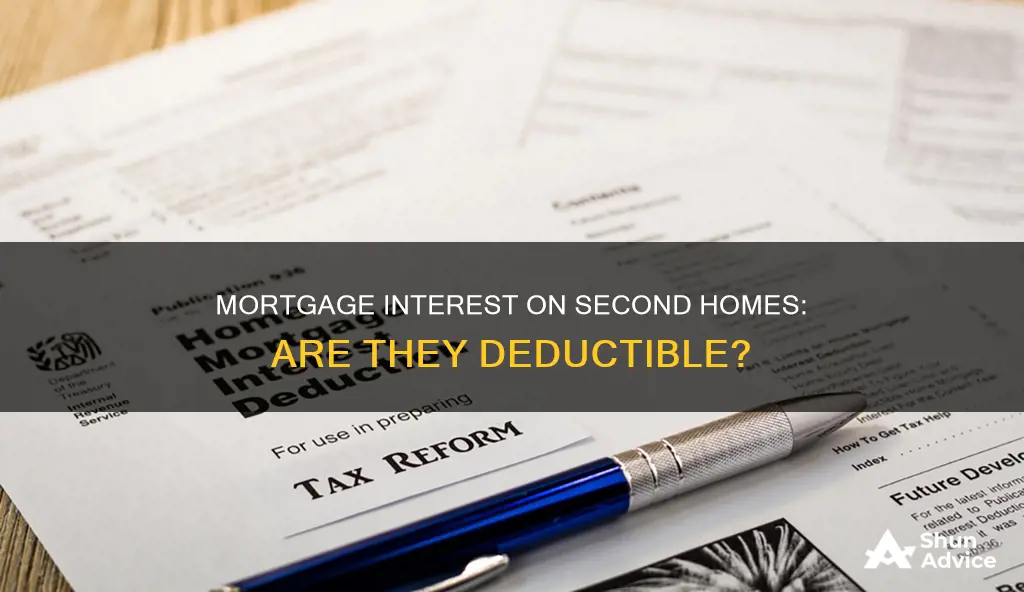
The interest charged on mortgages for a second home is generally deductible, but there are some requirements to be eligible for this tax benefit. The Internal Revenue Service (IRS) has set guidelines for when a home is considered a second home instead of a rental property. For the property to be considered a second home, it can't be rented out for more than 14 days during the year. The interest you pay on a mortgage on a home other than your main or second home may be deductible if the proceeds of the loan were used for business, investment, or other deductible purposes.
| Characteristics | Values |
|---|---|
| Is interest on mortgage in investment second home deductible? | Yes, but only if the property is considered a second home rather than a rental property. |
| Requirements | The property must not be rented out for more than 14 days during the year. |
| Interest charged on mortgages for a second home | Generally deductible. |
| Interest charged on mortgages for a home other than your main or second home | Deductible if the proceeds of the loan were used for business, investment, or other deductible purposes. |
What You'll Learn
- The interest charged on mortgages for a second home is generally deductible
- The property must be considered a second home, not a rental property
- The property must not be rented out for more than 14 days during the year
- The interest on the mortgage must be within the same limits as the interest on the mortgage of your first home
- The mortgage interest is currently tax-deductible up to the total amount of interest paid in any given year on the first $750,000 of your mortgage

The interest charged on mortgages for a second home is generally deductible
Firstly, it's important to distinguish between a second home and an investment property. If your second home is classified as a rental property, it may still be possible to deduct the mortgage interest, but the rules and requirements are different. To be considered a second home, the property cannot be rented out for more than 14 days during the year.
Additionally, the interest on a second mortgage is only deductible if it is used for acquisition indebtedness. This means that the loan must be used to acquire, build, or substantially improve the second home. The debt must also apply specifically to the home used to secure the second mortgage.
It's also worth noting that the tax laws regarding mortgage interest deductions have changed over time. For tax years prior to 2018, homeowners could write off 100% of the interest paid on up to $1.1 million of debt secured by their first and second homes. However, as of the current tax year, the mortgage interest is deductible up to the total amount of interest paid on the first $750,000 of the mortgage, or $375,000 if married and filing separately.
Therefore, while the interest charged on mortgages for a second home is generally deductible, it is important to be aware of the specific requirements and restrictions that may apply in your particular situation.
Investments and Interest: Multiple Bets, Better Returns?
You may want to see also

The property must be considered a second home, not a rental property
For a property to be considered a second home, it cannot be rented out for more than 14 days during the year. If it is rented out for more than 14 days, it is considered a rental property, and different rules and requirements apply.
The Internal Revenue Service (IRS) has set guidelines for when a home is considered a second home instead of a rental property. If you have a second home that you do not hold out for rent or resale to others at any time during the year, you can treat it as a qualified home.
The interest charged on mortgages for a second home is generally still deductible. However, there are other factors that can affect whether or not you qualify for interest tax deductions. For example, the debt must apply to the specific home you have used to secure the second mortgage if you want any sums to become eligible for interest deductions.
Understanding Interest-Free Investments: Classifying Returns
You may want to see also

The property must not be rented out for more than 14 days during the year
The interest charged on mortgages for a second home is generally deductible. However, there are some requirements to benefit from this tax relief.
Firstly, you must determine whether your property is considered a second home or an investment property. If your home would be classified as a rental property, you could still deduct the mortgage interest you pay, but the rules and requirements are different.
For the property to be considered a second home, it can't be rented out for more than 14 days during the year. If you have a second home that you don't hold out for rent or resale to others at any time during the year, you can treat it as a qualified home.
The interest you pay on a mortgage on a home other than your main or second home may be deductible if the proceeds of the loan were used for business, investment, or other deductible purposes. Otherwise, it is considered personal interest and isn't deductible.
Making Daily Interest: 1% Returns on Your Investments
You may want to see also

The interest on the mortgage must be within the same limits as the interest on the mortgage of your first home
If you use a house as a second home, rather than renting it out, the interest on the mortgage is deductible within the same limits as the interest on the mortgage on your first home. This is only the case if the second home is not rented out for more than 14 days during the year.
The interest charged on mortgages for a second home is generally still deductible, but there are some requirements to capitalise on this tax benefit. The mortgage interest is currently tax-deductible up to the total amount of interest paid in any given year on the first $750,000 of your mortgage, or $375,000 if married filing separately.
The interest you pay on a mortgage on a home other than your main or second home may be deductible if the proceeds of the loan were used for business, investment, or other deductible purposes. Otherwise, it is considered personal interest and isn't deductible.
Maximizing Investment Interest Expense Deductions: A Comprehensive Guide
You may want to see also

The mortgage interest is currently tax-deductible up to the total amount of interest paid in any given year on the first $750,000 of your mortgage
The Internal Revenue Service (IRS) has set guidelines for when a home is considered a second home instead of a rental property. For the property to be considered a second home, it can't be rented out for more than 14 days during the year. If you meet these requirements, the interest on the mortgage for your second home is deductible within the same limits as the interest on the mortgage on your first home.
For tax years prior to 2018, you could write off 100% of the interest you paid on up to $1.1 million of debt secured by your first and second homes and used to acquire or improve the properties.
It's important to note that there may be other factors that affect your eligibility for interest tax deductions. To qualify for deductions on a second mortgage, the debt must be acquisition indebtedness, meaning it was used to acquire, build, or substantially improve your main or second home.
Calculating Daily Accrued Interest: Maximizing Your Investment Returns
You may want to see also
Frequently asked questions
Yes, the interest charged on mortgages for a second home is generally deductible.
For the property to be considered a second home, it can't be rented out more than 14 days during the year.
If your home would be classified as a rental property, you could still deduct the mortgage interest you pay on that property, but the rules and requirements are different.
Mortgage interest is currently tax deductible up to the total amount of interest paid in any given year on the first $750,000 of your mortgage, or $375,000 if married filing separately.
A main home is where you ordinarily live most of the time. A second home is a home that you choose to treat as your second home.







